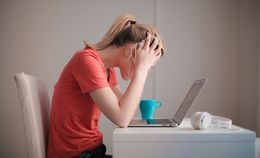Depression is a term that describes being stuck in a state of persistent, ongoing exhaustion, hopelessness, sadness and frustration. For people struggling with depression, life feels bleak and without purpose. This can make it very difficult to function.
It is important to understand that the feelings associated with depression are normal, and not a problem on their own. It's okay to feel uncomfortable emotions - you aren't depressed just because you have a rough day or a rough week. But painful feelings usually fade after a period of time. If you feel consistently low, you may be suffering from depression.
In other words, depression isn't about feeling a certain way, but being trapped in feeling that way.
There is no one cause of depression. Emotional suffering plays a big role for many people - those who have experienced abuse, trauma, emotional upheaval or significant conflict within themselves or with others are more likely to become depressed. Spiritual and existential confusion or crises can lead to depression. Research indicates the structure and level of activity within parts of the brain is also a factor. Diet, isolation or lack of human connection, family history, stress, exposure to environmental toxins, lack of sunlight or exercise, and certain health conditions can also contribute to depression.
Treating depression holistically typically means addressing several of these possible contributing factors. Psychotherapy and mind-body approaches are usually major parts of treatment and can help unwind any underlying emotional issues. Changes in nutrition and lifestyle also help many people considerably. For most people, depression is an indication that something in their life is blocked or isn't working right. Figuring out what that is and how to move forward is often the key to healing.
What are the symptoms of depression?
There are a number of symptoms typical of depression. Not everyone experiences all of these symptoms, but some of the most common include:
Low mood
Persistent feelings of tiredness or exhaustion
Struggling with anger and irritability
Ruminating on your fears, doubts and worries or feeling trapped in your head
Thinking of or attempting suicide
Feeling a sense of hopelessness, worthlessness and despair
Inability to enjoy life
Isolation and social anxiety
Indigestion or gut health problems
Lack of interest in sex
Eating too much or too little
Insomnia and/or excessive sleep
Difficulty with focusing or paying attention
Depression often goes hand-in-hand with various forms of anxiety. Many people who struggle with addiction of any kind also experience depression.
Types of depression
Doctors recognize several different types of depression. These share common elements but may have different causes, unique symptoms, or other distinguishing features. Types of depression include:
Major depressive disorder (MDD)
If you experience symptoms of depression for longer than two weeks, you could be diagnosed with major depressive disorder. Major depressive disorder, also called clinical depression or unipolar depression, is what is most commonly thought of as depression. It can be episodic - you may experience depression for a period of time, get better, and then experience additional bouts of depression down the road.
Persistent depressive disorder (PDD)
Also known as dysthymia, persistent depressive disorder refers to ongoing symptoms of depression that last for years. Many people experience persistent depressive disorder as a milder form of depression, a low-grade blues that never goes away for long. However, it can also be more intense, and for some people, debilitating.
Seasonal affective disorder (SAD)
Seasonal affective disorder is a specific type of depression that affects some people during the winter months. Caused largely by a lack of exposure to sunlight, SAD results in symptoms of depression, but goes away when spring arrives. People who live further from the equator or in regions that get less sunlight are more likely to develop SAD.
Psychotic depression
Psychotic depression is a specific type of major depressive disorder. A person with psychotic depression experiences many of the typical symptoms of depression, but may also hear voices, see hallucinations, experience delusions and otherwise struggle deeply with reality. The pain of feeling this way can make people with psychotic depression especially at risk for attempting suicide.
Postpartum depression
Women who have given birth may experience a sudden onset of depression. This is thought to be related to rapidly fluctuating hormones and the emotional upheaval of childbirth. Postpartum depression can range from mild to severe.
Bipolar disorder
Bipolar disorder is a condition related to depression, in which a person experiences alternating periods of depression and overexcitement (mania). They may feel low for days, and then suddenly begin to develop a great deal of energy. Both the highs and the lows can range from mild to severe. People with bipolar disorder are also at an especially heightened risk for suicide.
What are the causes of depression?
There are a number of factors that can lead to depression, or play a supporting role in developing the condition. These include:
Physical
Nutrition can be a major cause of depression. Processed foods, sugar, corn syrup, artificial sweeteners and vegetable oils can all wreak havoc on your brain and digestive health, which are deeply intertwined. For people with allergies or sensitivities, gluten and dairy can also be a problem. All these foods cause chronic inflammation, which has been linked to a host of mental and physical health problems. Sugar may also interfere with the production of brain derived neurotrophic factor (BDNF), a hormone that helps keep your neurons healthy and functioning. Most people with depression don't produce nearly enough BDNF.
Chronic stress is thought to be another factor. Your body's stress reaction - the fight, flight or freeze response - is meant to be a short term response to a dangerous situation. However, if you are one of the many people who experience chronic, ongoing stress, it is likely that your stress reaction never really turns off. Your body is continuously flooded with stress hormones and is responding to danger that isn't really there. People with depression typically have above average levels of stress hormones.
There is thought to be neurobiological elements to depression. Researchers have found that the hippocampus, a part of the brain that deals with long-term memory, is actually smaller than normal in people with depression. Meanwhile, the amygdala, which is the center of intense emotions like fear and sorrow, is more active than average. Neurotransmitters-chemicals produced in the brain that help your brain cells communicate with each other, are also believed to play a role.
There are also underlying health conditions that can result in depression. Virtually any gut health problems. not just those that are the result of a poor diet, affect brain health as well. These can include bacterial overgrowth, parasites, and leaky gut, among others. Thyroid and adrenal disorders, as well as other hormonal imbalances, can also cause symptoms of depression.
Taking certain prescription medications, as well as alcohol or recreational drugs can cause you to feel depressed. Some of the prescription medications linked to depression include: benzodiazepines, steroids, antibiotics, hormonal birth control, beta-blockers, statins, and opioids.
Genetic
There is no one gene or group of genes that specifically causes depression. However, depression does seem to run in families - research suggests that a family history of depression significantly increases your risk for developing depression yourself. This may be due to genetics, as well as the dynamics within the family and related lifestyle factors.
Emotional
Emotional suffering is probably the most important factor that can lead to developing depression. Depression is often described as anger turned inward, and while that may be an oversimplification, it points towards the emotional heart of the matter. Many people who become depressed are carrying emotional pain or conflict that they don't know how to get free from.
Indeed, research has found that traumatic experiences and the pain resulting from them is the single largest determining factor in whether or not someone develops depression. In other words, if you are struggling with trauma or emotional pain, you are significantly more likely to become depressed. Severe trauma such as an attack or natural disaster, or frequent smaller stressors can both lead to depression, as can major life changes of any kind.
Social support or lack thereof can also have a big influence on depression. People who have a partner, family member or another significant personin their life who is abusive are much more likely develop depression. People who struggle with social anxiety or don't have anyone to talk to also tend to experience depression as a result.
People who find themselves struggling with spiritual or existential suffering may also experience depression. Examples include feelings of disconnection from yourself, your values or the universe around you.
Environmental
Several environmental factors are known to affect depression. Lack of exposure to sunlight, especially morning sunlight, can lead to seasonal affective disorder and influence your mood. Toxins such as lead, mercury, and pesticides have also been shown to cause depression.
How do you heal from depression?
Treating depression holistically involves addressing the various factors that may be contributing. That may mean working with a therapist and other health professionals, as well as making changes to how you live your life.
Assessment
There is no medical test for depression. However, a qualified mental health professional, like a therapist, psychologist, social worker or counselor, can assess you for signs of depression and make a diagnosis if appropriate. An assessment typically explores your symptoms as well as life history, and should ideally be an ongoing process.
Lifestyle
Several key lifestyle changes can help you heal from depression. These include:
Exercise
Exercise can really help with depression. Sustained physical activity releases feel-good hormones called endorphins into your body, improving your mood. Exercise can also help you break out of patterns of isolation and inertia that often come with depression.
Sleep
Getting enough sleep is really important. Lack of sleep puts a great deal of strain on your mind and body, and can make symptoms of depression even worse. Don't sell yourself short on sleep, aim for at least 8 hours a night. This gives your brain time to recover and rejuvenate after the day.
Mind-body practices
Mind-body practices like meditation, yoga and tai chi can be effective ways to lift depression. They can help you to feel more connected to your body, and actually change the structure of your brain in beneficial ways. They can also help you develop a greater capacity for acceptance and ability to tolerate uncomfortable feelings.
Social support
While psychotherapy plays a big role in helping many people recover from depression, it is also a great idea to get emotional and social support from friends and loved ones. Spending time with people you like being around can help lift your mood and make you feel less isolated and disconnected from the world. It can also really help just to have someone to talk to.
Sunlight (and spending time in nature)
For people with seasonal affective disorder, getting enough sunlight (especially morning sunlight) is essential. However, getting out in the sun can also help people with other forms of depression, as it boosts your levels of vitamin D (and feels good). In addition, spending time outside, especially in nature, has been found to boost your mood and lower your level of stress.
Nutrition
Getting the right nutrition can be a significant part of healing from depression. A holistic physician or nutritionist can help guide you in this area.
Diet
Foods that negatively affect your brain and gut health can play a role in causing depression. These include:
Junk food
Processed foods
Sugar, corn syrup, and artificial sweeteners
Vegetable oils
Some people also have a hard time with dairy and grains, especially those containing gluten.
Experts often suggest eliminating these foods from your diet for a few weeks, and seeing how you feel.
In addition, some foods can help support good brain health. These include:
Good fats like olive oil, coconut oil, grass-fed butter or ghee, and avocado
Healthy proteins like beans, lentils, nuts, pasture-raised eggs and wild-caught fish
Fresh greens and fruits
Probiotic-rich foods like kefir and kombucha
Incorporate foods like this into your diet as much as possible. Cooking at home can be one way to help do this. It's also a great idea to drink lots of pure, clean water.
Supplements
Specific supplements can help boost brain functioning and may improve symptoms of depression. These include omega-3 fatty acids, B vitamins, 5-HTP, vitamin D, St. John's Wort and ashwagandha. It's also always a great idea to take a good probiotic to support your gut health.
Healing modalities: who should I go see?
Working with a therapist is a great first step towards healing depression. They can assess you, create a treatment plan, and perform psychotherapy to help you work with any emotional and mental factors that may be contributing to your symptoms. They can also point you toward other resources that may be helpful, and refer you to other health professionals as appropriate.
Psychotherapy can help heal depression, but it is worth remembering that the strength of your relationship with your therapist is a huge part of what makes psychotherapy effective. In other words, it is important to work with a therapist you feel safe talking to. If you don?t feel comfortable with the first therapist you meet, try scheduling an appointment with another.
Working with a holistic physician can also be really helpful. Because depression can sometimes be the result of another health problem, it is important to rule that out as a cause, especially if your depression persists in the face of other treatment efforts. A holistic doctor can also help you with the nutritional aspects of depression.
Emotional freedom techniques (EFT) can be very useful for treating depression. EFT is a form of psychological acupressure that can address deep-rooted emotional issues. An EFT practitioner or (or psychotherapist who has additional training in EFT) can help you develop an EFT routine.
What about medication?
Many psychiatrists and other doctors seek to treat depression using medication, including antidepressants and antipsychotics. This can help you feel better. However, such medications do nothing to heal the root causes of depression, people who stop taking medication for depression generally find that their depression comes back. For many people, psychiatric medication is also no more effective than a placebo at reducing symptoms of depression.
In addition, antidepressant and antipsychotic medications have many serious side effects. For example, antidepressants significantly increase your likelihood of attempting suicide, while antipsychotics have been found to actually make your brain smaller.
Many holistic medical professionals believe that psychiatric medications can have a role in treating depression, but should be used only as a last resort, such as cases where a patient is at risk of harming themselves or others, and then only for long enough to help the patient stabilize. Longer-term treatment should ideally be based on practices that can actually heal depression, such as psychotherapy.
References:
What Causes Depression?
Harvard Medical School, 2009
Please Don't Visit This Type of Doctor Unless You Absolutely Have To
Dr Mercola
Depression's Upside
Jonah Lehrer
New York Times, 2010





















